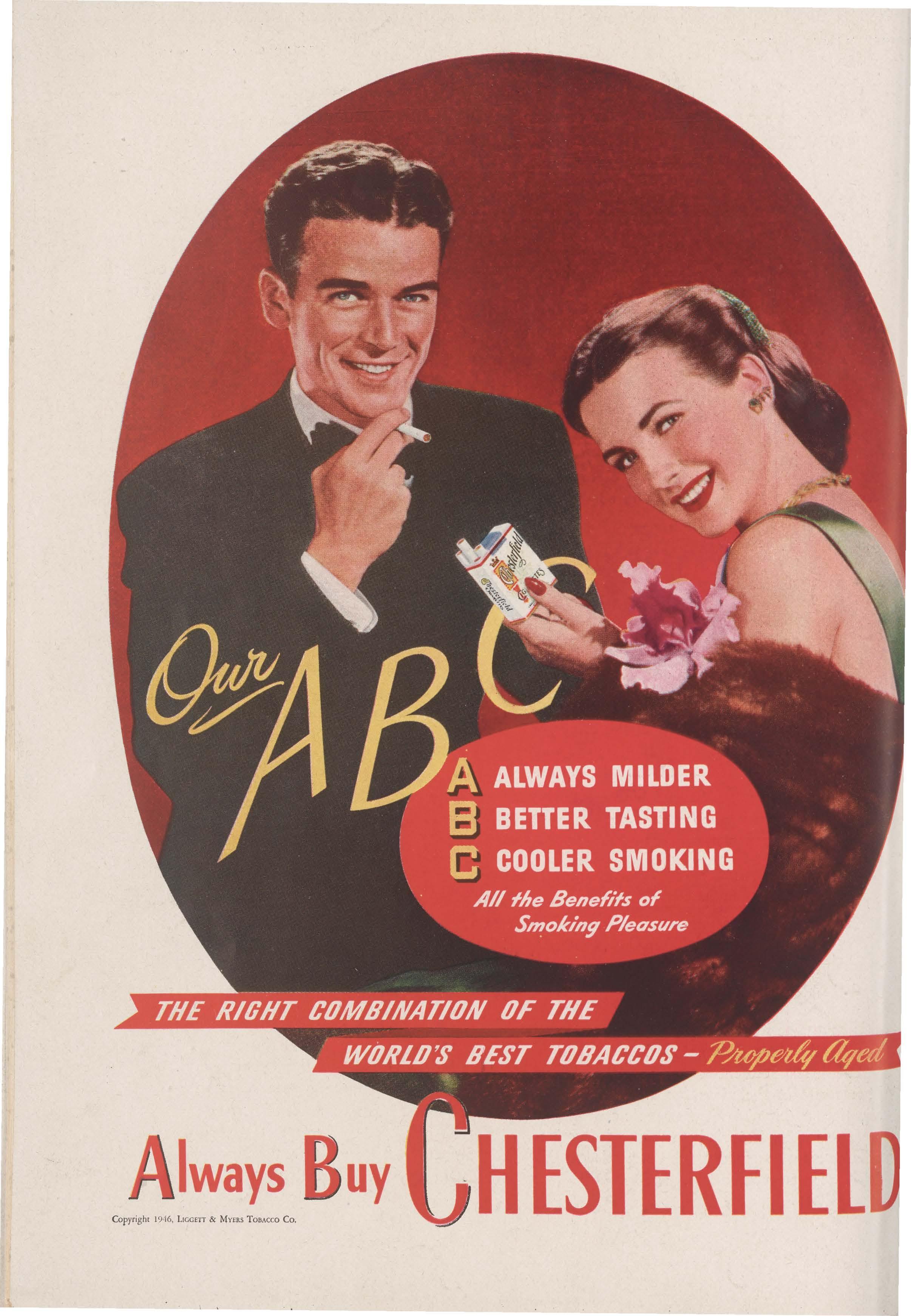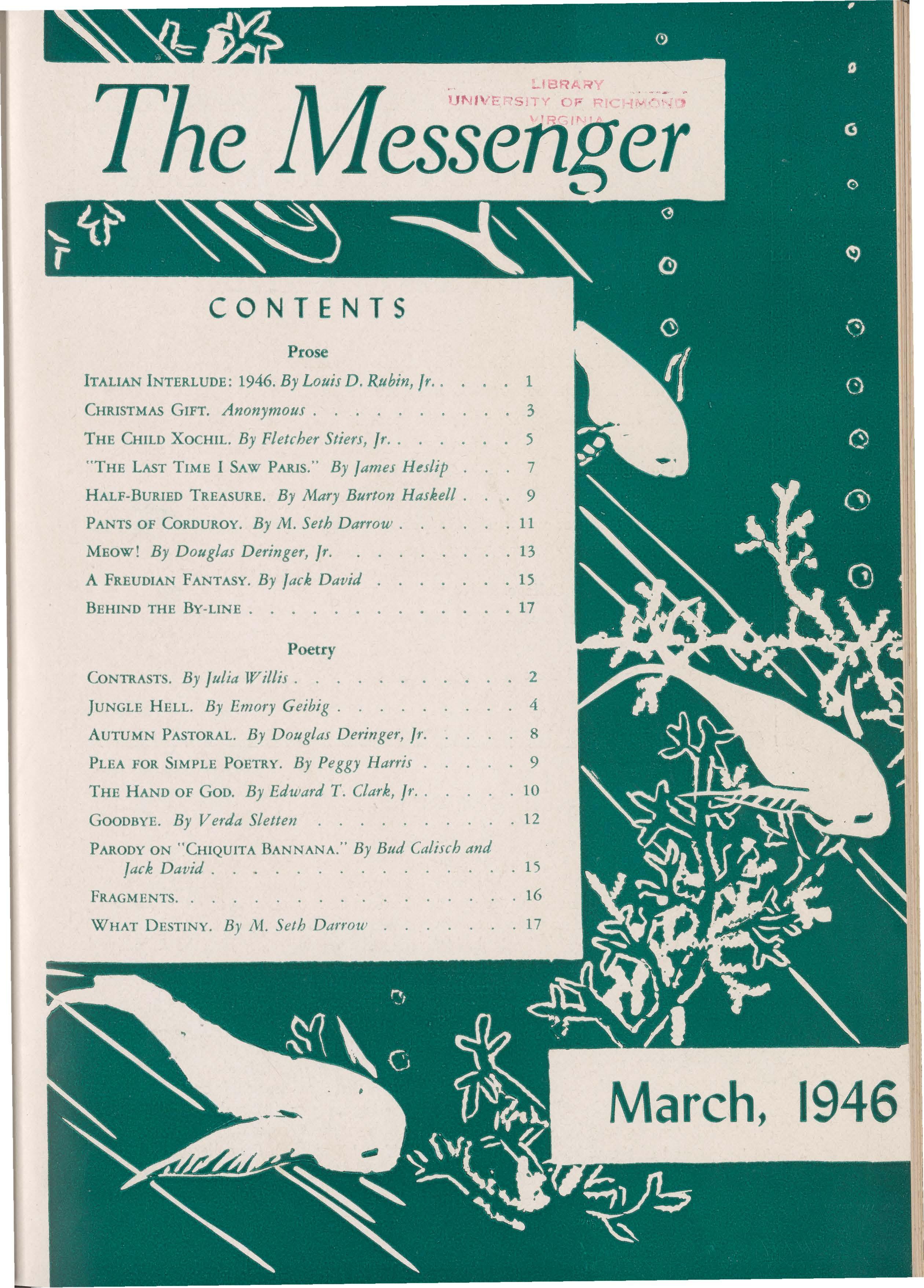

SHORT STORY CONTEST &1
&1
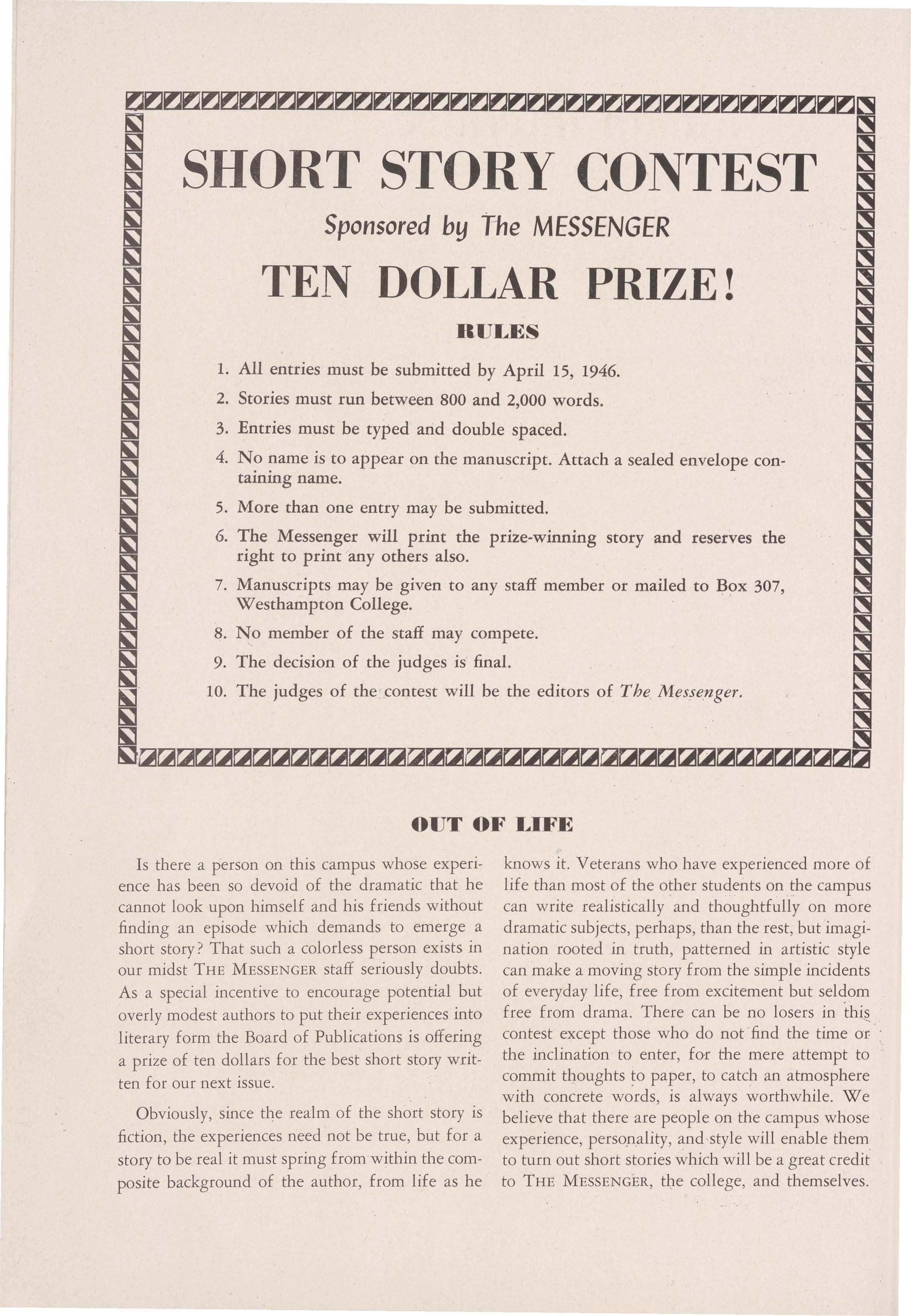
Sponsoredby The MESSENGER
E TEN DOLLAR PRIZE! &i RULES
1. All entries must be submitted by April 15, 1946.
2. Stories must run between 800 and 2,000 words.
3. Entries must be typed and double spaced.
4. No name is to appear on the manuscript. Attach a sealed envelope con&1 taining name.
5. More than one entry may be submitted.
6. The Messenger will print the prize-winning story and reserves the right to print any others also. l'!II.I
7. Manuscripts may be given to any staff member or mailed to Box 307, &1 Westhampton College.
8. No member of the staff may compete. &1
9. The decision of the judges is final.
10. The judges of the ' contest will be the editors of The _Messenger.
OUT OF LIFE
Is there a person on this campus whose experience has been so devoid of the dramatic that he cannot look upon himself and his friends without finding an episode which demands to emerge a short story? That such a colorless person exists in our midst THE MESSENGERstaff seriously doubts. As a special incentive to encourage potential but overly modest authors to put their experiences into literary form the Board of Publications is offering a prize of ten dollars for the best short story written for our next issue.
Obviously, since the realm of the short story is fiction, the experiences need not be true, but for a story to be real it must spring from within the composite background of the author , from life as he
knows it. Veterans who have experienced more of life than most of the other students on the campus can write realistically and thoughtfully on more dramatic subjects, perhaps, than the rest , but imagination rooted in truth, patterned in artistic style can make a moving story from the simple incidents of everyday life, free from excitement but seldom free from drama. There can be no losers in thi s. contest except those who do not find the time or the inclination to enter, for the mere attempt to commit thoughts ~o paper, to catch an atmosphere with concrete words, is always worthwhile We believe that there are people on the campus whose experience, perso nality, and style will enable them to turn out short stories ~hich will be a great credit to THE MESSENGER,tl:ie college, and themselves
Italian Interlude : 1946
By LOUIS D. RUBIN, JR.
You are a writer, are you not, signor?"
He asked me that after sitting for some moments in silence. My table had been the onl y one not completely occupied in the inn, and he had asked for and received my permission to share it with me
" It wasn ' t a very difficult deduction, " he explained when I showed some surprise at his accurate observation. "There is a certain something abo ut you writers which always g{ves you away. It never fails .
" I fear that you can find very little of beauty a bo ut which to write in Italy now. Our village used to be a favorite place for many of you writers before the war came along . The war was very hard on the little town of Villa Contina , signor. At one time it was a thriving little village, and the towns all about would send their produce here for marketing, out on the public square you see there.
" I have heard it said that a writer used to be able to find material for a hundred stories just by sitting and observing the market place and the people , and I believe it. Now , you have found it much more difficult , have you not , signor?"
I suppose I should have told the fellow that, w hile I was a writer all right, I did not write fiction, and was only a journalist. However , I merely ag reed with him about the sparsity of material and permitted him to continue .
"Yet, signor ," the Italian continued, "these pe o ple here could tell you many strange stories about their lives during the past few years , stories that are so fantastic you would scarce believe them. And yet , for the most part, they would be true."
He paused and looked casually about the little tavern before he continued. " For instance, I know something that happened to a man I know quite w ell, and it's so strange that I am sure you won't believe it. But, I'll tell it to you , if you like. It is a true story, I swear it! "
It was early in the afternoon , and the train for Naples would not be leaving for several hours, so I told the fell ow I would be delighted to hear his story.
" The man's name, signor," he began, "was Alberto. Before the war, he was a farmer on the out-
skirts of town I think he had quite some cleverness at writing, but his opinions did not coincide with those of the Black Shirt militia who were in control of things, so he tilled the soil rather than express his views in print.
"He had a sister, namea Lucrezia. Signor , she was a beautiful woman indeed ... dark, flashing eyes, rich black hair, a most delightfully proportioned figure . Ah, signor, she was a lovely thing!
" l"{aturally, many of our town's young men asked her hand in marriage, but she would have none of them. Not for her a peasant's life in our little village! Not for Lucrezia . She waited. Sure enough, along came a fellow named Farinacci n o t the famous one , a distant cousin, I think who was a lieutenant in the Army. He was a dashing young scoundrel, this Farinacci , and he stood rather high in Party circles, too.
"Lucrezia took one look at the fellow and knew that here was the man for her , a man who would go places in the New Italy. Her brother objected to him , of course, but I can assure you that Lucrezia paid little heed to his opinions.
"She married the fellow , and they went to his home at Castelvecchio, about thirty miles south of here , to live. That was some three years before the war, and not once did she come back to visit her family! Too far beneath her new role in life, as wife to the promising young officer, you know; she would do better to forget them.
"The war came along, and the brother, Alberto , was called into the Army and sent to Africa. For awhile, things were all right, but as America entered the war and things began to go badly for the Italian Army, he was heard from only rare ly, and after the invasion of Sicily, not at ail.
"No one knew what had happened to him, and after the mainland was invaded and the surrender came, nobody had time to worry about him The Germans retreated north and our little village soon was occupied by the Allied armies.
"One day, who sh ould come home but Alber t o! He had been wounded and taken prisoner at Salerno, and now he h oped to be permitted to forget the war and the Fascists, and to begin his farming ag~m.
(Con t inu ed o n p a,~e 2)
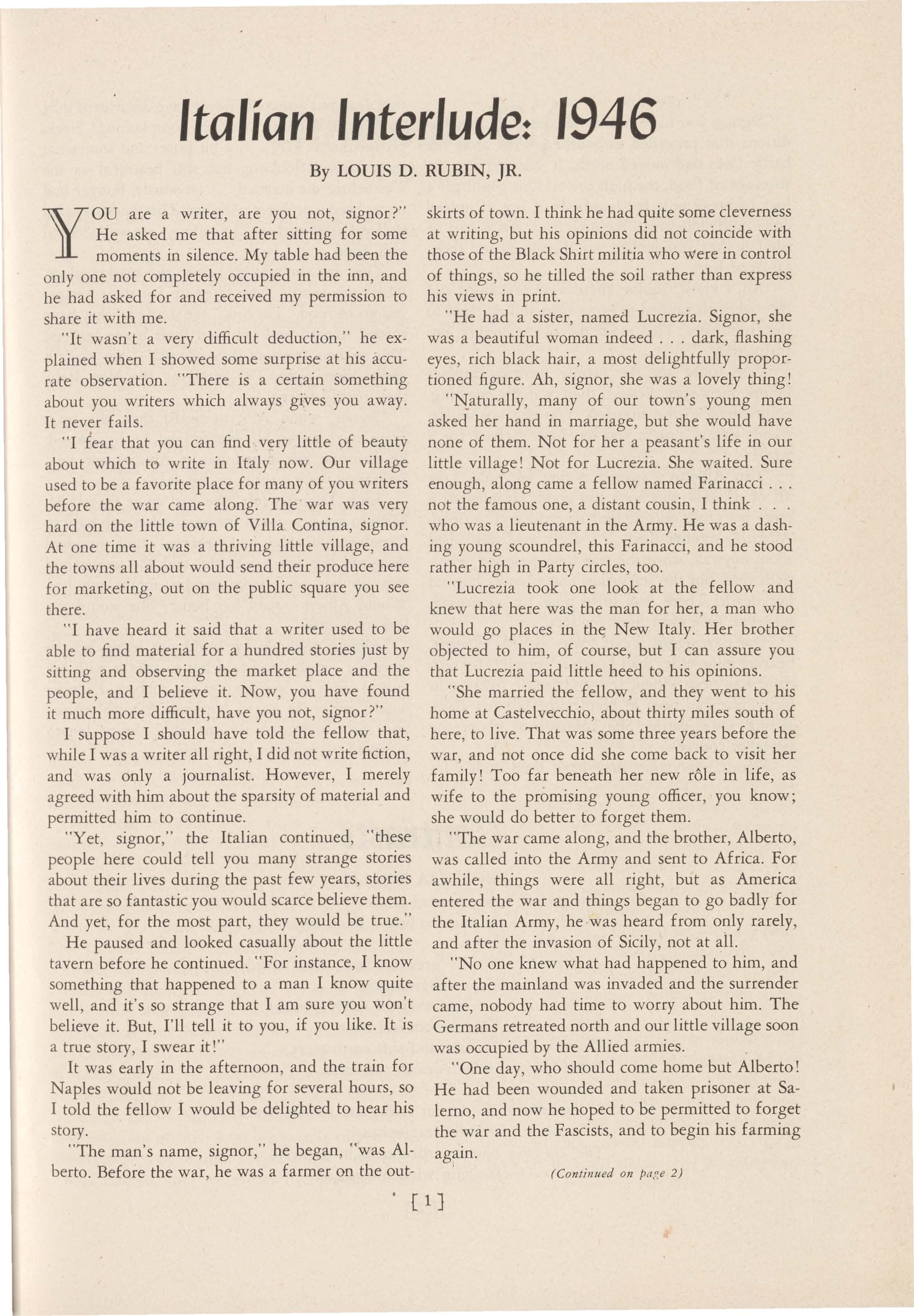
' [ 1]
(Continued from page 1)
"Signor, you have heard, of course, of the conditions that prevailed in Southern Italy after the battle lines had moved north. It was terrible, the shortage of food, the high prices! One could get a loaf of bread only for hundreds of lire, if indeed one could find bread to buy! And, for a suit of used clothes, one had to pay thousands and thousands of lire!
"Ah, I know, signor; there were few ships and they were all needed to bring men and materiel to the front lines. That made us no less hungry, unfortunately.
'
"One could see the people growing thinner before one's eyes. Always, there was the gnawing, empty ache in the stomach. You can not understand, signor, unless you too have starved for a while.
"This Alberto managed as best he could. Like all of us, that was none too good. He planted a crop, but crops take so long to grow and to ripen. Alberto's mother died she would have died soon, anyway, since she was long past her seventieth year, but the starvation undoubtedly hurried her death. There was little time for mourning, however. One must hunt for food.
"One day, signor, a cart comes to Villa Contina, bearing none other than Lucrezia herself! Her husband had been killed, she said, while fighting in Sicily. She had been in Naples the last few days, selling some cattle. She complained about the times, of course.
"Signor, starvation may have been Italy's lot

that year, but one could never have discovered it by looking at Lucrezia. She was complaining! Sleek, prosperous as ever a bit fatter and somewhat more sensual looking, but still beautiful as she was before she married ... obviously, hunger had never been a problem with her. They had prepared well at Castelvecchio. The cellars were well stocked with food.
"One day she walked out to the market place, where the people were lined up for their meager rations of food. "For this," she snarled, "they have turned coward and betrayed their brave leaders! This is their freedom they wanted! I am glad; it serves them right! For betraying the New Italy, they should starve!
"Signor, when Alberto heard that, the tears came into his eyes. His eyes bulged, his lips parted, he stared at her incredulously. Amazement, consternation were written on his face.
"Soon, Lucrezia left. She had come to ask Alberto to act as a guard for her, on her trip back to Castelvecchio. She had received four hundred thousand lire for her cattle, and she was afraid that on her way home bandits might rob her. Would Alberto escort her home? She would pay him, of course.
"Alberto told her he could not leave, but he gave her a pistol and told her to take it with her and to use it in case she met any robbers. Lucrezia would pref er the guard, but since Alberto refused and she could trust no one else, she at length accepted the weapon and set off.
(Continued on p age 14)
Contrasts
By JULIA WILLIS
The purple, heavy-headed Flags
March down the path on broad, thick stems. They guard the house,
And nod a friendly greeting from their sturdy lemon-fragrant congregation. A Flag will thrive wherever the earth is warm, Wherever the knotted root is thrown. Down where the la1::eand so£t earth meet, Where watery fingers search the earth
In rooty caves,
There from their slender stems and fibrous roots , pale iris lift wild fragile heads. The iris grow where earth retains its mystery, Wherever the singing wind blows free.
[ 2]
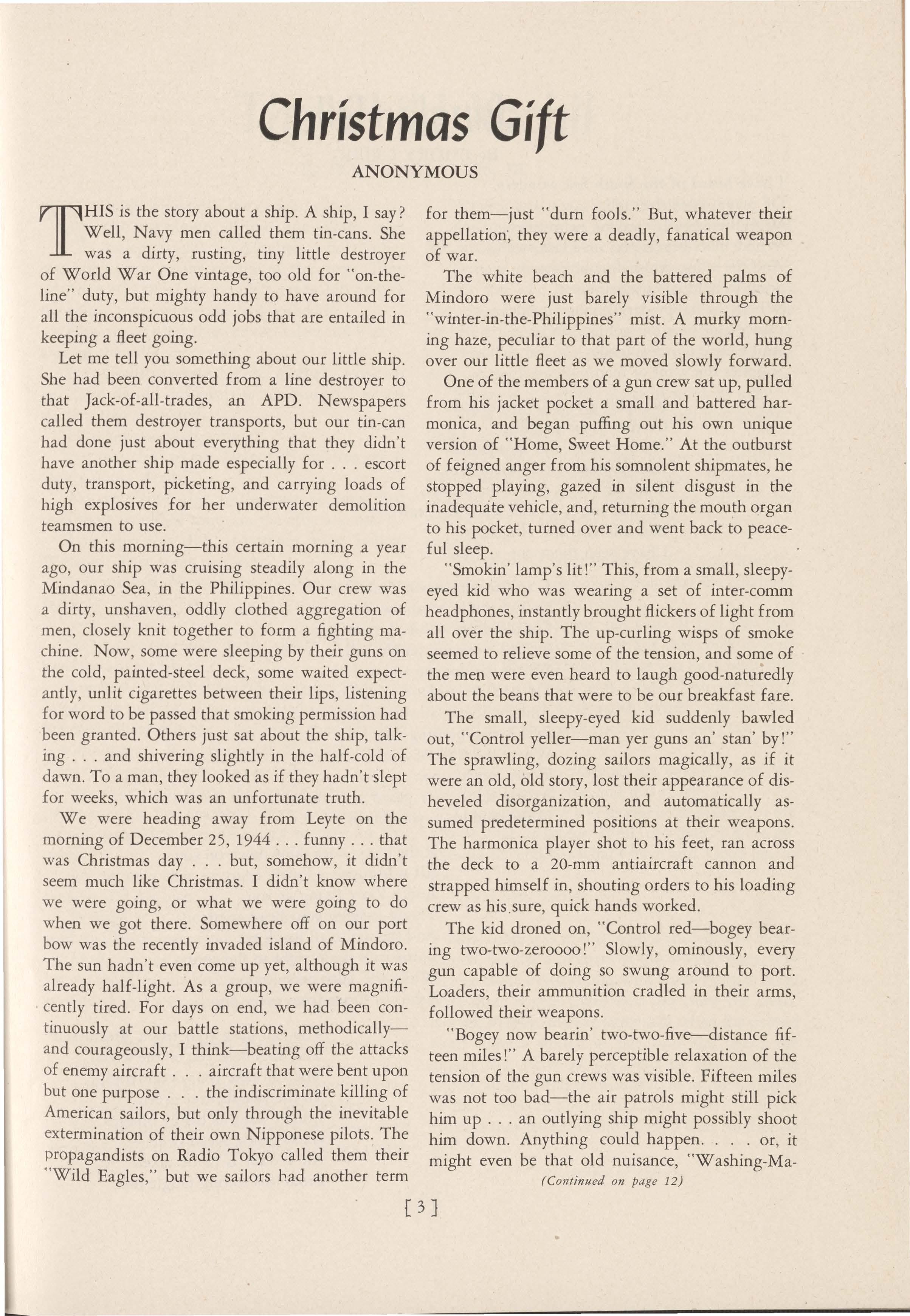
ChristmasGift
ANONYMOUS
THIS is the story about a ship. A ship, I say? Well , Navy men called them tin-cans. She was a dirty, rusting, tiny little destroyer of World War One vintage, too old for " on-theline" duty, but mighty handy to have around for all the inconspicuous odd jobs that are entailed in keeping a fleet going.
Let me tell you something about our little ship. She had been converted from a line destroyer to that Jack-of-all-trades, an APD. Newspapers called them destroyer transports , but our tin-can had done just about everything that they didn ' t have another ship made especially for . . . escort duty, transport , picketing, and carrying loads of high explosives for her underwater demolition teamsmen to use
On this morning-this certain morning .a year ago , our ship was cruising steadily along in the Mindanao Sea, in the Philippines. Our crew was a dirty , unshaven, oddly clothed aggregation of men , closely knit together to form a fighting machine. Now, some were sleeping by their guns on t he cold, painted-steel deck, some waited expecta ntly, unlit cigarettes between their lips, listening fo r word to be passed that smoking permission had been granted . Others just sat about the ship, talking ... and shivering slightly in the half-cold of dawn. To a man, they looked as if they hadn't slept for weeks, which was an unfortunate truth .
We were heading away from Leyte on the morning of December 25, 1944 .. . funny .. . that w as Christmas day but, somehow , it didn't seem much like Christmas. I didn't know where w e were going, or what we were going to do w hen we got there. Somewhere off on our port bow was the recently invaded island of Mindoro The sun hadn't even come up yet, although it was a lready half-light. As a group , we were magnificently tired. For days on end, we had been cont inuously at our battle stations, methodicallya nd courageously, I think-beating off the attacks of enemy aircraft aircraft that were bent upon b ut one purpose . . . the indiscriminate killing of American sailors, but only through the inevitable extermination of their own Nipponese pilots. The propagandists on Radio Tokyo called them their " Wild Eagles," but we sailors bad another term
for them-just "durn fools." But, whatever their appellation·, they were a deadly, fanatical weapon of war.
The white beach and the battered palms of Mindoro were just barely visible through the "winter-in-the-Philippines" mist. A murky morning haze, peculiar to that part of the world, hung over our little fleet as we moved slowly forward.
One of the members of a gun crew sat up, pulled from his jacket pocket a small and battered harmonica, and began puffing out his own unique version of "Home, Sweet Home." At the outburst of feigned anger from his somnolent shipmates, he stopped playing, gazed in silent disgust in the inadequate vehicle, and, returning the mouth organ to his pocket, turned over and went back to peaceful sleep.
" Smokin' lamp's lit!" This, from a small, sleepyeyed kid who was wearing a set of inter-comm headphones, instantly brought flickers of light from all over the ship. The up-curling wisps of smoke seemed to relieve some of the tension, and some of the men were even heard to laugh good-naturedly about the beans that were to be our breakfast fare.
The small, sleepy-eyed kid suddenly bawled out, "Control yeller-man yer guns an ' stan' by!" The sprawling , dozing sailors magically, as if it were an old, old story, lost their appearance of disheveled disorganization, and automatically assumed predetermined positions at their weapons. The harmonica player shot to his feet, ran across the deck to a 20-mm antiaircraft cannon and strapped himself in, shouting orders to his loading crew as his sure, quick hands worked.
The kid droned on, "Control red-bogey bearing two-two-zeroooo!" Slowly, ominously, every gun capable of doing so swung around to port. Loaders, their ammunition cradled in their arms, followed their weapons.
"Bogey now bearin' two-two-five-distance fifteen miles!" A barely perceptible relaxation of the tension of the gun crews was visible . Fifteen miles was not too bad-the air patrols might still pick him up an outlying ship might possibly shoot him down. Anything could happen. . . . or, it might even be that old nuisance, "Washing-Ma(Continued o n p ag e 12)
[ 3]
JungleHell
By EMORY GEIBIG
I have heard of the South Sea wonders, Of magic Isles they tell, With their gently swaying palm trees Where moonbeams play on a lazy swell, And the warm and balmy breezes
See.mto hold you in their spell, Where the happy dark-skinned maidens Dane~ and sway on golden sands And nature in her splendor
Supplies the want of man.
Now I'll give you my version Of this tropic paradise
With its ants and mosquitoes And its hundred different flies. With its snakes and all its lizards, Worms and bugs that walk and crawl, Bats and rats and alligators I have seen them one and all.
I can ' t see the waving palm trees Or the gentle ocean swells , I'm too deep within the tangle Of this steaming jungle hell. Where the dongue and malaria Try your very blood to drain, And you live in all your misery In this ever-pouring rain
Where the stink of rotted jungle Floats to you upon the breeze , As you stand your guard at daybreak In the mud up to your knees
If the moon does shine down on you All it brings is a lonely heart, And a Zero diving at you Trying to blow your head apart. And the suri in all its glory
Burns your brain right to the core, While the salty perspiration Seems to steam from every pore.
You can have your tropic dreamland That they flash you on the screen, You can take your ocean voyage To the islands ever green. I don't want its balmy breezes
Or its gentle ocean swellAll I want is to be taken From this rotting jungle hell.

[ 4]
TheChildXochil
By FLETCHEJ;lSTIERS, JR.
WHEN Abnerella, the daughter of Lorenzo, the blacksmith, died all the village wept except Xochil, her daughter, whose father was not known to the people of the town. They let Abnerella sleep on the little green hill among the young pines where she had wished it.
"How strange it is that the child does not weep." One of the villagers spoke.
"It is God's payment for the mother's sins that her child should not weep at her funeral." It was another that answered.
"How say you such a thing!"
"But it is clear to me. Do not all children cry at their parents ' death?"
"No, my cousin did not because he knew that then there would be more for the others to eat. "
" I say that this child is without tears Ssshhh. Whisper! They come this way. "
"It is too bad. Now she has neither mother nor father. "
"Yes."
" Such a young and pretty child! Who shall have to care for her?"
"Lorenzo, the old man who was her mother's father. Say nothing. They are passing now. Look! See how all stare at her. They know that this child is without tears. It is because of the mother's sins. They have passed, now we can talk."
"She would not name the child's father to the priest even on her deathbed. Poor Lorenzo, he is an old man How can he· expect to care for this child?"
"Let us pray that he cares for this one better than he did his own. "
" Perhaps it is the sins of the grandfather as well that keeps tears from her eyes."
"Hush, do not say such a horrible thing. Come, let us return to our homes with the others. There is nothing that we can do here at the grave."
" Good day, blacksmith. How are you and your family?"
"I am well, but the child I do not understand."
" It is because of her grief for her mother."
" I do not understand. For seven day.s we acted w ell, but after that it was different. I do not understand it!"
"What is it that you do not understand?"
"For four days now she has not eaten or spoken one word, yet she seems well."
"Perhaps the child eats elsewhere "
"Ah, but who in this poor village has food to give away? No, I say that she has not eaten or spoken a word for four days. I tell her to eat. I command it, but she seems not to hear me and does not touch the food."
"Where is this child? I would speak to her."
"She is here in the shop. I will call her. Xochil ! Child, come here."
"Child, why is it that you do not eat, or do as your grandfather commands of you? Forget your grief. Your mother was a bad woman, and you are the product of her sin. Forget her. To live one must eat. "
"Do you hear what he has said to you, Xochil? Now go back to your play I pray that she will heed what you have said to her. "
"I am sorry for you, old man. It is a pity that you must now- have to care for this child in your last years. She will take all that you have been able to save for yourself. It is a pity! You are an old man and cannot work much longer, and she will take all that you have put away for your last days. It is a pity!"
"I shall have to work all my days it seems, but that is the way of life, and it is cruel."
"I cannot see why you should be punished for the sins of your daughter. Well, old man, I must go. Remind the child of what I have said. Good day to you."
"Good day, friend."
Now there was in this town a church, and in the church, besides a likeness of the Virgin Mary, was one of Saint Francis, and with Saint Francis there were three angels. Here each day came the child, Xochil, to pray, and she knew that when she prayed Saint Francis smiled at her, and she heard the angels too. Now as she went to and from the church all the villagers would come to the windows of their shops or houses and look at her. "It is sinful that they let her in the church. Why do they do it?"
(Continued on page 6)
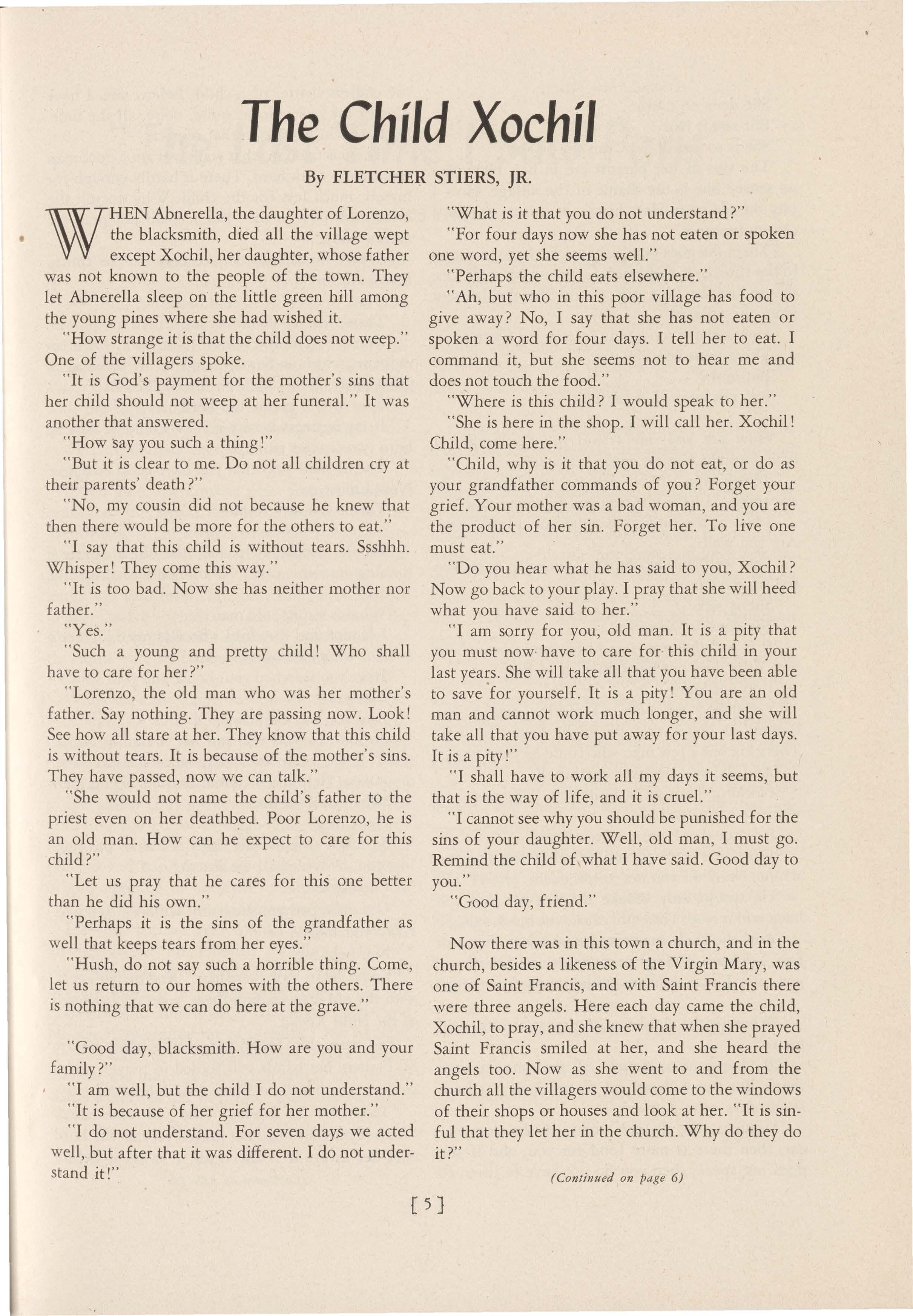
[ 5}
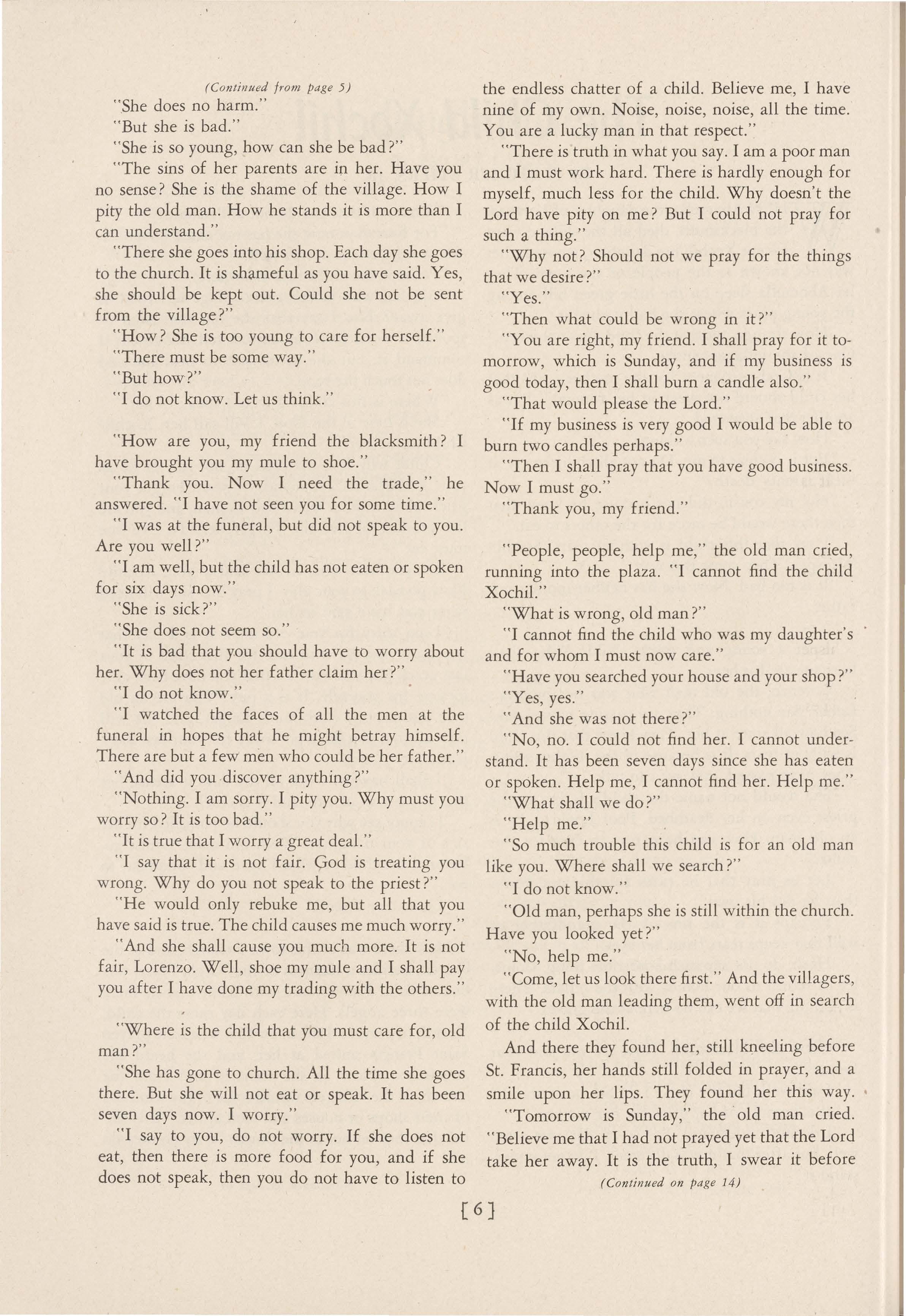
(C on t inu ed f1·om pag e 5)
"She does no harm."
"But she is bad."
"She is so young, how can she be bad?"
"The sins of her parents are in her. Have you no sense? She is the shame of the village. How I pity the old man. How he stands it is more than I can understand."
"There she goes into his shop. Each day she goes to the church. It is shameful as you have said. Yes , she should be kept out. Could she not be sent from the village?"
" How? She is too young to care for herself ."
" There must be some way."
"But how?"
"I do not know. Let us think."
"How are you, my friend the blacksmith? I have brought you my mule to shoe."
"Thank you. Now I need the trade," he answered. "I have not seen you for some time."
"I was at the funeral, but did not speak to you. Are you well?"
"I am well, but the child has not eaten or spoken for six days now. "
"She is sick?"
" She does not seem so. "
" It is bad that you should have to worry about her. Why does not her father claim her?"
" I do not know. "
" I watched the faces of all the men at the funeral in hopes that he might betray himself. There are but a few men who could be her father."
"And did you discover anything?"
" Nothing. I am sorry. I pity you. Why must you w orry so? It is too bad."
" It is true that I worry a great deal."
" I say that it is not fair. God is treating you w rong. Why do you not speak to the priest? "
" He would only rebuke me, but all that you have said is true. The child causes me much worry. "
" And she shall cause you much more. It is not fair , Lorenzo. Well, shoe my mule and I shall pay you after I have done my trading with the others."
"Where is the child that you must care for, old man? "
"She has gone to church. All the time she goes there. But she will not eat or speak. It has been seven days now. I worry."
"I say to you, do not worry. If she does not eat, then there is more food for you, and if she does not speak, then you do not have to listen to
the endless chatter of a child. Believe me, I have nine of my own. Noise, noise, noise, all the time. You are a lucky man in that respect."
"There is truth in what you say. I am a poor man and I must work hard. There is hardly enough for myself, much less for the child. Why doesn't the Lord have pity on me? But I could not pray for such a thing."
"Why not? Should not we pray for the things that we desire?"
" Then what could be wrong in it?"
"You are right, my friend. I shall pray for it tomorrow, which is Sunday, and if my business is good today, then I shall burn a candle also "
"That would please the Lord."
"If my business is very good I would be able to burn two candles perhaps. "
"Then I shall pray that you have good business. Now I must go ."
"Thank you, my friend. "
" People, people, help me, " the old man cried, running into the plaza. "I cannot find the child Xochil. "
" What is wrong, old man? "
" I cannot find the child who was my daughter ' s and for whom I must now care. "
" Have you searched your house and your shop? "
" Yes, yes."
"And she was not there? "
" No , no. I could not find her. I cannot understand. It has been seven days since she has eaten or spoken. Help me, I cannot find her. Help me."
" What shall we do? "
" Help me. "
" So much trouble this child is for an old man like you Where shall we search? "
"I do not know ."
" Old man, perhaps she is still within the church Have you looked yet? "
" No, help me. "
" Come, let us look there first. " And the villagers , with the old man leading them , went off in search of the child Xochil.
And there they found her, still kneeling before St. Francis, her hands still folded in prayer, and a smile upon her lips. They found her this way.
"Tomorrow is Sunday, " the old man cried. "Believe me that I had not prayed yet that the Lord take her away . It is the truth, I swear it before (Conti n ued o n pa ge 14) [6}
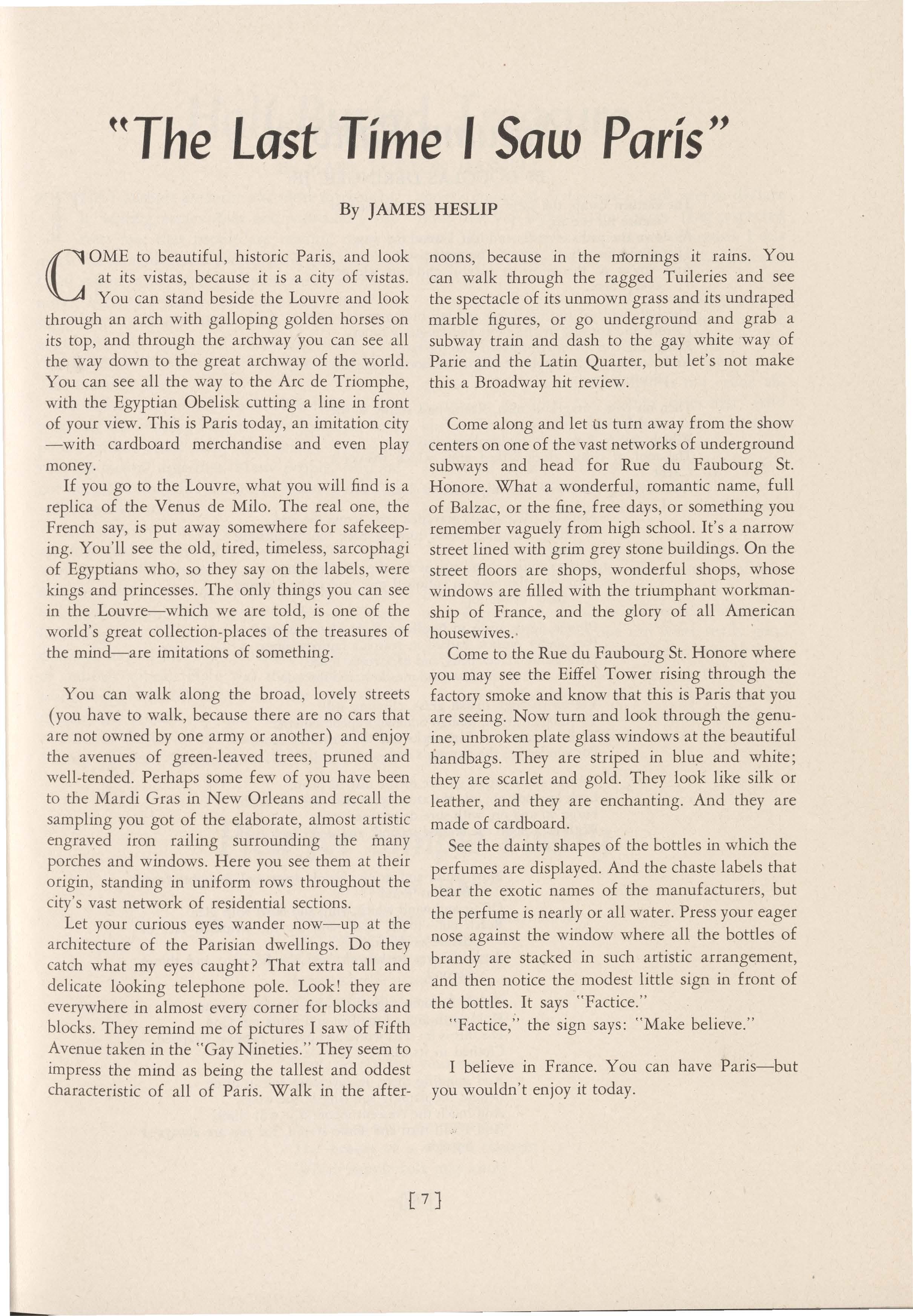
ttTheLastTimeI SawParis''
By JAMES HESLIP
COME to beautiful, historic Paris, and look at its vistas, because it is a city of vistas. You can stand beside the Louvre and look through an arch with galloping golden horses on its top, and through the archway you can see all the way down to the great archway of the world. You can see all the way to the Arc de Triomphe, with the Egyptian Obelisk cutting a line in front of your view. This is Paris today, an imitation city -with cardboard merchandise and even play money.
If you go to the Louvre, what you will find is a replica of the Venus de Milo. The real one, the French say, is put away somewhere for safekeeping. You'll see the old, tired, timeless, sarcophagi of Egyptians who, so they say on the labels, were kings and princesses. The only things you can see in the Louvre-which we are told, is one of the world's great collection-places of the treasures of the mind-are imitations of something.
You can walk along the broad, lovely streets (you have to walk, because there are no cars that are not owned by one army or another) and enjoy the avenues of green-leaved trees, pruned and well-tended. Perhaps some few of you have been to the Mardi Gras in New Orleans and recall the sampling you got of the elaborate, almost artistic engraved iron railing surrounding the many porches and windows. Here you see them at their origin, standing in uniform rows throughout the city's vast network of residential sections.
Let your curious eyes wander now-up at the architecture of the Parisian dwellings. Do they catch what my eyes caught? That extra tall and delicate looking telephone pole. Look! they are everywhere in almost every corner for blocks and blocks. They remind me of pictures I saw of Fifth Avenue taken in the "Gay Nineties." They seem to impress the mind as being the tallest and oddest characteristic of all of Paris. Walk in the after-
noons, because in the mornings it rains. You can walk through the ragged Tuileries and see the spectacle of its unmown grass and its undraped marble figures, or go underground and grab a subway train and dash to the gay white way of Parie and the Latin Quarter, but let's not make this a Broadway hit review.
Come along and let us turn away from the show centers on one of the vast networks of underground subways and head for Rue du Faubourg St. Honore. What a wonderful, romantic name, full of Balzac, or the fine, free days, or something you remember vaguely from high school. It's a narrow street lined with grim grey stone buildings. On the street floors are shops, wonderful shops, whose windows are filled with the triumphant workmanship of France, and the glory of all American housewives. , ·
Come to the Rue du Faubourg St. Honore where you may see the Eiffel Tower rising through the factory smoke and know that this is Paris that you are seeing. Now turn and look through the genuine, unbroken plate glass windows at the beautiful f1andbags. They are striped in blu~ and white; they are scarlet and gold. They look like silk or leather, and they are enchanting. And they are made of cardboard.
See the dainty shapes of the bottles in which the perfumes are displayed. And the chaste labels that bear the exotic names of the manufacturers, but the perfume is nearly or all water. Press your eager nose against the window where all the bottles of brandy are stacked in such artistic arrangement, and then notice the modest little sign in front of the bottles. It says "Factice."
"Factice/' the sign says: "Make believe."
I believe in France. You can have Paris-but you wouldn't enjoy it today.
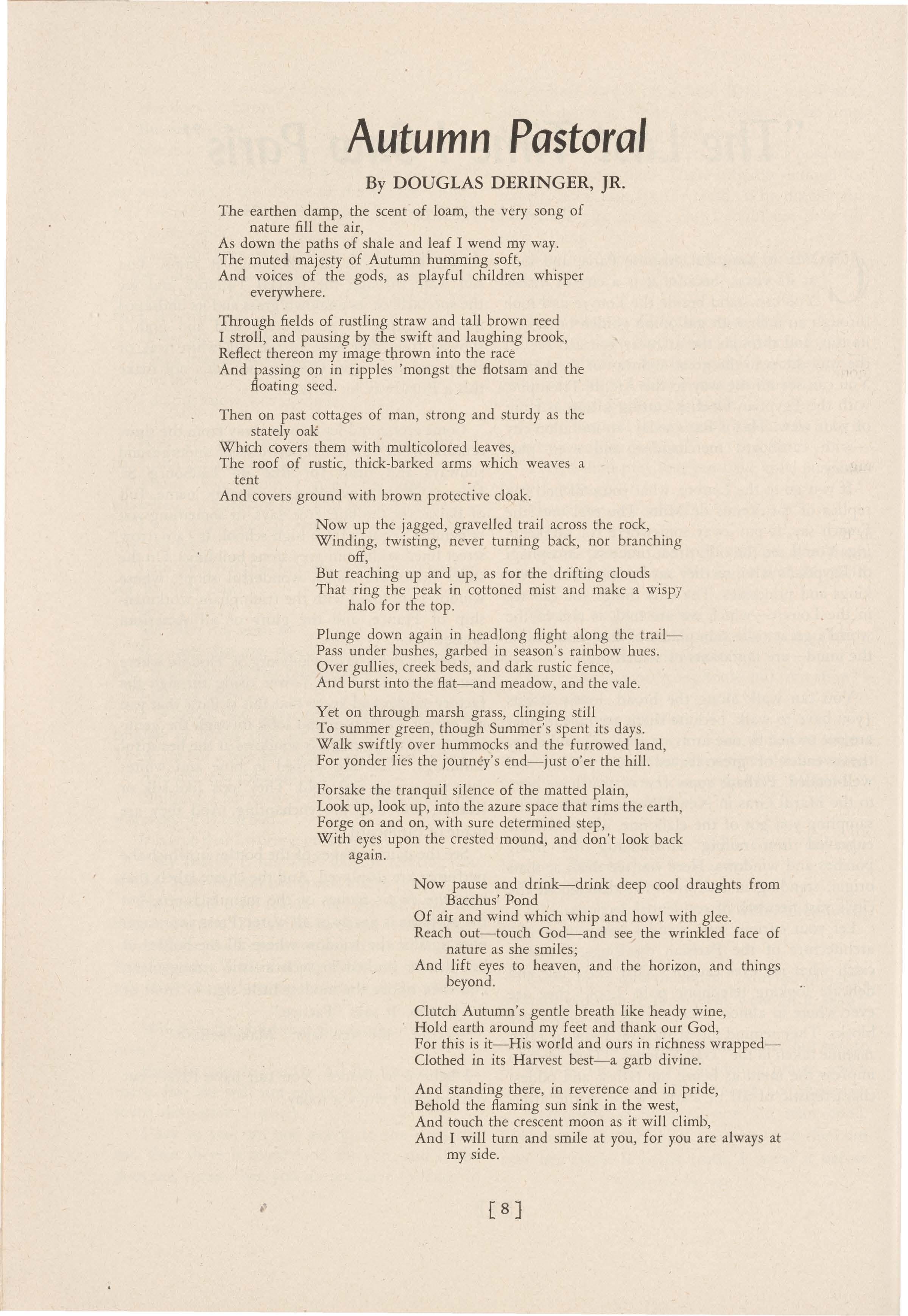
AutumnPastoral
By DOUGLAS DERINGER, JR.
The earthen damp, the scent of loam, the very song of nature fill the air,
As down the paths of shale and leaf I wend my way. The muted majesty of Autumn humming soft, And voices of the gods, as playful children whisper everywhere.
Through fields of rustling straw and tall brown reed I stroll, and pausing by the swift and laughing brook, Reflect thereon my image thrown into the race And passing on in ripples 'mongst the flotsam and the floating seed.
Then on past cottages of man, strong and sturdy as the stately oak'
Which covers them with multicolored leaves, The roof of rustic, thick-barked arms which weaves a tent
And covers ground with brown protective cloak.
Now up the jagged, gravelled trail across the rock, Winding, twisting, never turning back, nor branching off,
But reaching up and up, as for the drifting clouds That ring the peak in cottoned mist and make a wisp y halo for the top
Plunge down again in headlong flight along the trailPass under bushes, garbed in season's rainbow hues. Over gullies, creek beds, and dark rustic fence , And burst into the flat- and meadow , and the vale
Yet on through marsh grass, clinging still To summer green, though Summer's spent its days. Walk swiftly over hummocks and the furrowed land , For yonder lies the journey's end-just o ' er the hill.
Forsake the tranquil silence of the matted plain, Look up, look up, into the azure space that rims the earth, Forge on and on, with sure determined step, With eyes upon the crested mound, and don't look back agai0.
Now pause and drink-drink deep cool draughts from Bacchus' Pond
Of air and wind which whip and howl with glee . Reach out-touch God-and see the wrinkled face of nature as she smiles; And lift eyes to heaven, and the horizon, and things beyond.
Clutch Autumn's gentle breath like heady wine, Hold earth around my feet and thank our God, For this is it-His world and ours in richness wrappedClothed in its Harvest best-a garb divine.
And standing there, in reverence and in pride, Behold the flaming sun sink in the west, And touch the crescent moon as it will climb, And I will turn and smile at you, for you are always at my side.
Half-BuriedTreasure
By MARY BURTON HASKELL
THAT authors are more and more infrequently writing essays does not particularly distress me; that people are reading them in much the same degree I consider the greatest loss. I can induce most of my acquaintances to read a novel, even one rather long and old, but at the suggestion of essays the person is apt to look anguished and squirm off mumbling words here translated as "some other year, some other life." This maddens me.
Good fiction I do not wish to condemn in any w ay, but the reading of only this compares to a purely carbohydrate diet. The reader will soon ruin his mental digestion. Many people, who are no t uncommonly dull , can digest nothing but curr ent magazine stories .
• At fifteen my summer reading forced upon me m y first real volume of pers smal essays, Henry Van Dyke's Fisherm a n ' s Luck. Never can I rem ember having been so thrilled by a book, for I ha d discovered the unobscured thoughts of a living , breathing man! Here was no disguise of plot and ch a racter to probe through, no three hundred pages of indirect appeal. Here was the essence of the m an ' s thought clearly before me! But when school opened, my ecstacy was somewhat quieted by my classmates' dislike of the book, and the only way I could still their comments on the English depart-
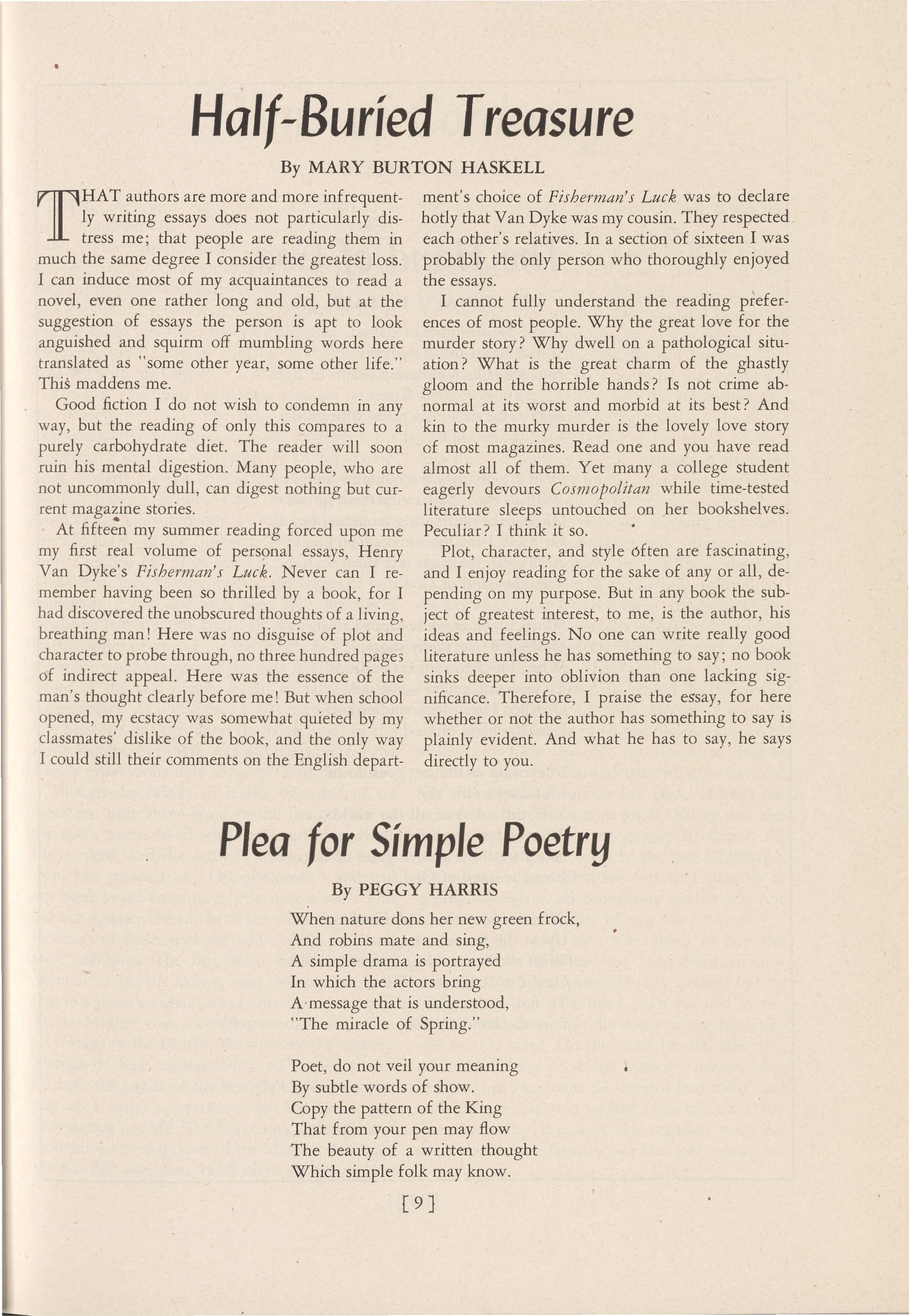
ment' s choice of Fisherman's Luck was to declare hotly that Van Dyke was my cousin They respected each other ' s relatives. In a section of sixteen I was probably the only person who thoroughly enjoyed the essays.
I cannot fully understand the reading preferences of most people. Why the great love for the murder story? Why dwell on a pathological situation? What is the great charm of the ghastly gloom and the horrible hands? Is not crime abnormal at its worst and morbid at its best? And kin to the murky murder is the lovely love story of most magazines. Read one and you have read almost all of them Yet many a college student eagerly devours Cosmopolitan while time-tested literature sleeps untouched on her bookshelves. Peculiar? I think it so.
Plot, character, and style often are fascinating, and I enjoy reading for the sake of any or all, depending on my purpose. But in any book the subject of greatest interest , to me, is the author, his ideas and feelings. No one can write really good literature unless he has something to say; no book sinks deeper into oblivion than one lacking significance. Therefore, I praise the essay, for here whether or not the author has something to say is plainly evident. And what he has to say, he says directly to you.
Pleafor SimplePoetry
By PEGGY HARRIS
When nature dons her new green frock, And robins mate and sing, A simple drama is portrayed In which the actors bring A -message that is understood, "The miracle of Spring."
Poet, do not veil your meaning By subtle words of show.
Copy the pattern of the King That from your pen may flow The beauty of a written thought Which simple folk may know.
[9}

TheHandof God
By EDWARD T. CLARK, JR.
In the golden quiet of dawn
Which lights the eastern sky And sends its welcoming beams of light To every dew-filled flower And to the meadows green with grass, I see the hand of God.
Or if I look toward mountains high With all their glory round them spread, Or hear the murmuring mountain brook, Or when I see the snowcapped crags And watch the eagle o'er them soar, I see the hand of God.
When I look at white-capped foam Dashing to the sandy shore, When I look toward far horizons
To see a sail, a mere white sail, Or when I hear the pounding surf, I see the hand of God.
In evening as the sun goes down I look up to the sky.
I see the colors of all the worlds, The goddess of all nature, And thru those golden gates of heaven I see the hand of God.
When in nocturnal dark flook
Up to the heavens, bright
With all the sparkling jewels spread, Or if I walk the moonbeam path
To find a peaceful shrine, I see the hand of God.
Pantsof Corduroy
By M. SETII DARROW
THE Boy was eight years old today. His eighth birthday-what a wonderful occasion. To the Family it meant nothing; to the Boy it w as everything. It was today that he would get the long pants , those wonderful corduroy pants that he h a d wanted for such a long time Even as he lay in bed , he could feel them swishing about his ankles, the corrugated material making a rhythm that changed with his tempo .
The Boy' s life had not been a pleasant one, to the observer at least. The Boy, however , would h ave stalwartly protested any such inference, for ignorance itself was the protector of his convictio ns. Poverty lay not only across the doorstep of the Boy' s abode, it filled every corner of the tworoom shack. Unfortunately, I cannot picturesquely de scribe his home as an unkempt tenement house in a poor section of "other-side-Chicago"; it was far worse than this . Hidden behind the larger of two tenements, it had originally been built , perhaps it would be better to say hurriedly thrown together , by the owner of one of the tenements as a storage p la ce for whatever part of the junk overflow from either of the two houses might be salvaged for reconversion . At a glimpse , it was hard to draw a line between this trash and the possessions of the Boy's Family , but there was a distinction , for the Family possessions only supplemented the trash.
Though the family in reality consisted of six m embers , only three lived in the house. One of the Boy's sisters lived with the family for whom she worked, and the second , after a brief courtship , had married an " Out-of-towner, " and had no t been heard from in a little over a year. This did not dampen the spirits of the other two female m embers of the household, and the Boy followed their examples. The Boy often went to the city h ospital to see his father, who, having lost both leg s in a plant accident, was bordering on insanity. To the Mother, this, incredibly enough, was an asset instead of the liability that one would suppose. T hough it was apparent that no money passed through the hands of the household, she was putting up a better appearance than she had in any time during her life. The Sister was a younger and more attractive duplicate of the Mother. Although she was but seventeen, every night she donned her
high-heeled slippers, and went clicking down the street to a world unknown to the Boy.
The Boy saw little of his family. When he ate his breakfast of bread and candy, his mothe; and sister were still sleeping. When he came home in thl evenings the mother was out, and the sister was too busy applying rouge and perfume to pay much attention to an eight-year-old brother. The Boy idolized his sister, almost to the extent of worship. He thought her taste the personification of per£ ection. Though he harbored no desire to ever become an integral part of her world , he was sure that he admired it, for certainly it must be of a superlative degree for his sister to harken every night to its call. The Boy was never awake when his sister came home, but each morning he found the candy which she brought him sitting on the ragged rocker. This candy, along with his share of whatever bread might be in the box, sufficed for the day's first meal. The boy often wondered where the sister always got enough money to bring him this treat , for she slept nearly all day, and was out all night, but if he questioned her, she would laughingly say that the man behind the counter at Mac's was a friend of hers. Money seemed to come and go quickly with the sister-she never seemed to have any to contribute to household expenses and insisted that what money she had was needed to go on her back. Indeed , the money she handled was in small change, but she had numerous dresses, all gaudy, all flimsy, all showing her supple curves to the best advantage. It was quite evident that she preferred quantity to quality, though in all probability quality was not a word in the vocabulary of east-side Chicago. It was the sister who was going to buy the pants for his birthday-the long swish-aroundthe-ankle, corduroy pants. Highly exalted by the thought, the boy scrambled from his bed in the kitchen, and crept into the room where his sister and mother slept. On the chair lay the box containing the long promised birthday present. Retiring to his own room, he stepped into them, and with great satisfaction walked from his bed to the door, watching the cuffs rub together with his every movement, listening to the soft music cre-
(Con t i n ued on page 14)

[ 11}
(Continued from page 3) chine Charlie." He was an enemy airplane that sporadically came just within the radar screen, usually at mealtime, or when everyone was trying to snatch some sleep, and then went away again as soon as the sailors had manned their battle stations.
"Bogey now four miles-bearin' two-two-three -LOAD!" Like a well-oiled machine, the men loaded their _guns,and then picked up more ammo, ready to serve again.
"Plane sighted-well on the port quarter!" Heads jerked as one to get a look at the enemy. Through the murky haze of the Pacific dawn, a neat Tony fighter appeared. It climbed to a thousand feet, circled the little ship once, and flipped over into a screaming dive. The guns of the little destroyer pounded furiously, spitting up incandescent lines of tracers at the hurtling aircraft. The Jap plane, strafing as it dove, crashed headlong into the little ship with an ear-·shattering, blinding explosion of bombs and gasoline ... and rocket-like plumes of black smoke rose high into the morning air.
Once more, the ship was quiet. Only a few low moans from the wounded and the crackling of the flames were heard to break through the silence. The gunner on the 20-mm-remember the one who had been playing "Home, Sweet Home" on his harmonica ?-was hanging, llf eless, from his gun. His two loaders lay, still as death, on the deck beneath him. The small, sleepy-eyed kid with the head-
phones was conscious, and trying desperately to crawl-on his hands and knees-away from the fire which raged a few feet from him. But that telephone line prevented his moving any farther, the flames engulfed his slight body, and he never knew why he had died.
Six men who had labored to make the ship move out of danger were found in the fireroom, burned to a crisp by their own steam, super-heated steam which could cut through the human body like a ripsaw, so intense is its heat. Thirty-six more died a quick and painless death. Five met theirs the hard way-death by torturous, agonizing hours of suffering. And two others from the little ship's crew were never found.
And our little ship-that rusting, ancient, heroic little ship-did not sink, but stayed afloatstayed afloat until months later, when she was assigned to Red Lead Row-that nautical boneyard for all ships who have outlived their utility. Truly, an ignominious end for so gallant a craft. And, of the one hundred and forty-seven men who had sleepily faced the dawn off Mindoro that morning of December 25, 1944, only five were unharmed in mind or body.
Several weeks later this little squib app~ared in some of the papers back in the states.
"It has been announced that one of our destroyers was attacked December 25 by Kamakazi off the coast of Mindoro. Slight damage was done to the ship and there was no loss of personnel."
Ah, me-the dear, cloistered, sheltered public.
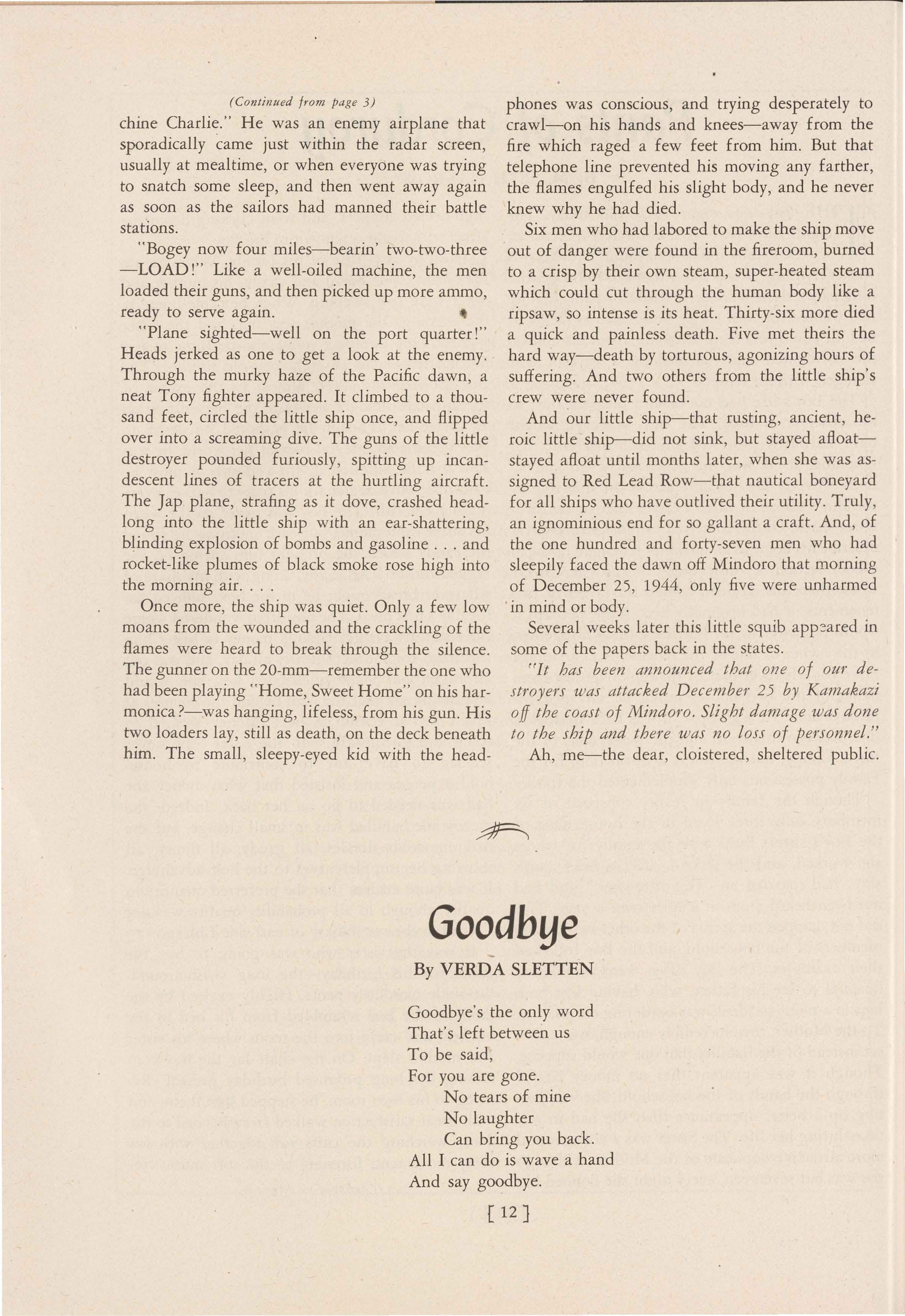
Goodbye
By VERDA SLETTEN
Goodbye's the only word That's left between us
To be said,
For you are gone. No tears of mine
No laughter
Can bring you back.
All I can do is wave a hand
And say goodbye.
[ 12)
Meow!
By DOUGLAS DERINGER, JR.
0H, Helen, it's so nice to see you! I was simply thrilled when you called and asked me to meet you for lunch. Gossip? Oh no, I haven't heard a thing for ages-simply ages. I'm certainly glad you asked me down. Oh no, really I don't mind coming down, but, oh dear, it is such a problem with these crowded trains and all. Mind? My dear, of course not! But it does seem that people could be a little more considerate! Imagine, all those men and people trying to commute all at the same time. So many trying to get to work that it hardly leaves room for anyone with important business.
Oh, my dear, you have no idea; it's devastating, simply devastating. Why, I feel as if I'd been caught in a wringer. Oh dear, it's so nice of you to say it, but I look too bedraggled for words. No, really. It's all the fault of those horrible commuters. Oh, you should see some of the people who ride the trains these days.
Such crowds-people just mangling you in the rush to get a seat. No, I didn't break any bones, but my poor feet! Do you mind if I take off my shoes? The tablecloth is long, so it won't show. Anyhow, all these horrible people just push and squeeze like men at a bar. They have no respect for a girl's feel in gs, to say nothing of her limbs. Well, when I finally got in, there just wasn't a seat to be found. I tried to look my sweetest, but do you know those awful men just buried themselves in the paper and growled. I think chivalry is just dead. And the women aren't any better. Do you think they'd squeeze over? No, they just smile sweetly and leave you to be mauled and pawed by the mob. Finally that nice little Mr. Twigg gave me his seat. You know, Gladys Twigg's husband-the one Henry always says is henpecked. If more men were like him, life would be so much nicer. He's a dear, only I can't see why Gladys ever married him-he's so dull!
But the people you see---at Stanbrook that Miss What's-her-name, yes, Jean, What's-her-name, got on, and, dear, you should have seen the outfit she had on. It was just horrid. Why, I wouldn't have been caught in it at one of Henry's lodge parties. I certainly don't see why men say she's pretty. Why, even before I discovered Antoine, I
was much prettier. Yes, I guess she does have her points, but she's so-oh, well, you know!
Oh I can hardly wait to tell you. At Lindsey, guess who got on-Mr. Freeling-and with that secretary of his. Yes, that awful woman. She must put her make-up on with a trowel. I hear they' re having an affair and poor Mrs Freeling doesn't know a thing about -it. Do you think we should tell her? How do_I know? Why I overheard it at the B_ridge Club not two months ago. Jo Anne got it from · Betty who heard it from her laundress who's a good friend of Mrs. Freeling's maid. Oh, yes, it's a very reliable source. But I think it's horrible the way men carry on. She must be mortified, utterly mortified, but then she's no bargain either. I've heard some things about her, too.
And honestly, Helen, I don't know what's becoming of children these days. Three got on at Heathgate, and they looked so sweet, but I heard them whispering about that "old lady" and pointing at me! Honestly, such rudeness. It shows how some people keep a home and family. Yes, they were Marie Carter's, I think. But when I think that only a short while ago, we were that ageWhat? Oh no, not twenty-five years. Well reallyAll right, so it was twenty-three. But I'm sure we were never so ill-mannered. It just shows how some people live. You know Jack drinks and spends all his nights out. Marie says it's work, but I wouldn't be so trusting. Yes, and she's quite a social butterfly herself. Why she even tried to flirt with Henry at our last Community Social. Imagine! I do feel so sorry for those poor children, but I was never so insulted in all my life. Honestly, the things you have to put up with! And I always try to be so nice to people and think only the best of them.
Oh, my dear, here comes that horrid Janet King, and Elsie Harris is with her. Oh do let's get out of here quickly. They're so--well, you knowthey're just cats. Well I know you haven't eaten, but we can go somewhere else. What's that? Your lunch hour is up in ten minutes? Well, dear, I'll have to run then-have an appointment, y' know. Oh dam, where are those shoes! It's been such fun, really, and I do want to see you again soon.
(Continued on page 14)

[ 13]
Italian Interlude: 1946
(Continued from page 2)
"On the way out of town, she met an old friend. He looked at the pistol, found it was unloaded, and so he gave her several cartridges to use with it. He loaded the weapon for her, and she continued her journey.
"Before I tell you what happened, signor, let me remind you that Alberto had been half-starving. His mother had died. He, who had fought for a cause he did not espouse but because of his love for Italy had stayed on he was almost starving. Here was his sister, who had grievously hurt him before the war, and who had not only condoned but had supported the evil forces that had brought this ruin to Italy. She was fat, prosperous, had food aplenty, four hundred thousand lire; his family were hungry and cold.
"That evening, signor, in the twilight, a masked man steps from behind a tree and demands her money. She raises the pistol, he comes on. She pulls the trigger, the gun fires, wounds him in the leg. He falls to the ground, paralyzed with pain. She runs over, snatches off the mask.
"Signor, can you guess who it is? It is Alberto! She leaves him there, thinking he is dying, and drives home.
Meow!
(Continued from page 13)
Oh, here they come--I must run. Really, darling, I hate to leave you, but I'm in a horrible mooddevastated, simply devastated, and I can't stand · women, especially older women who do nothing but criticize and talk about people all the time! I simply hate cats, don't you?
The Child Xochil
(Continued from page 6)
God." And he went running from the church as the villagers laughed at him, but they hushed their laughter when some~ne noticed and told the others that the three angels which had once guarded St. Francis were no longer there, and there were tears in the eyes of the child that was called Xochil.
She was dead.
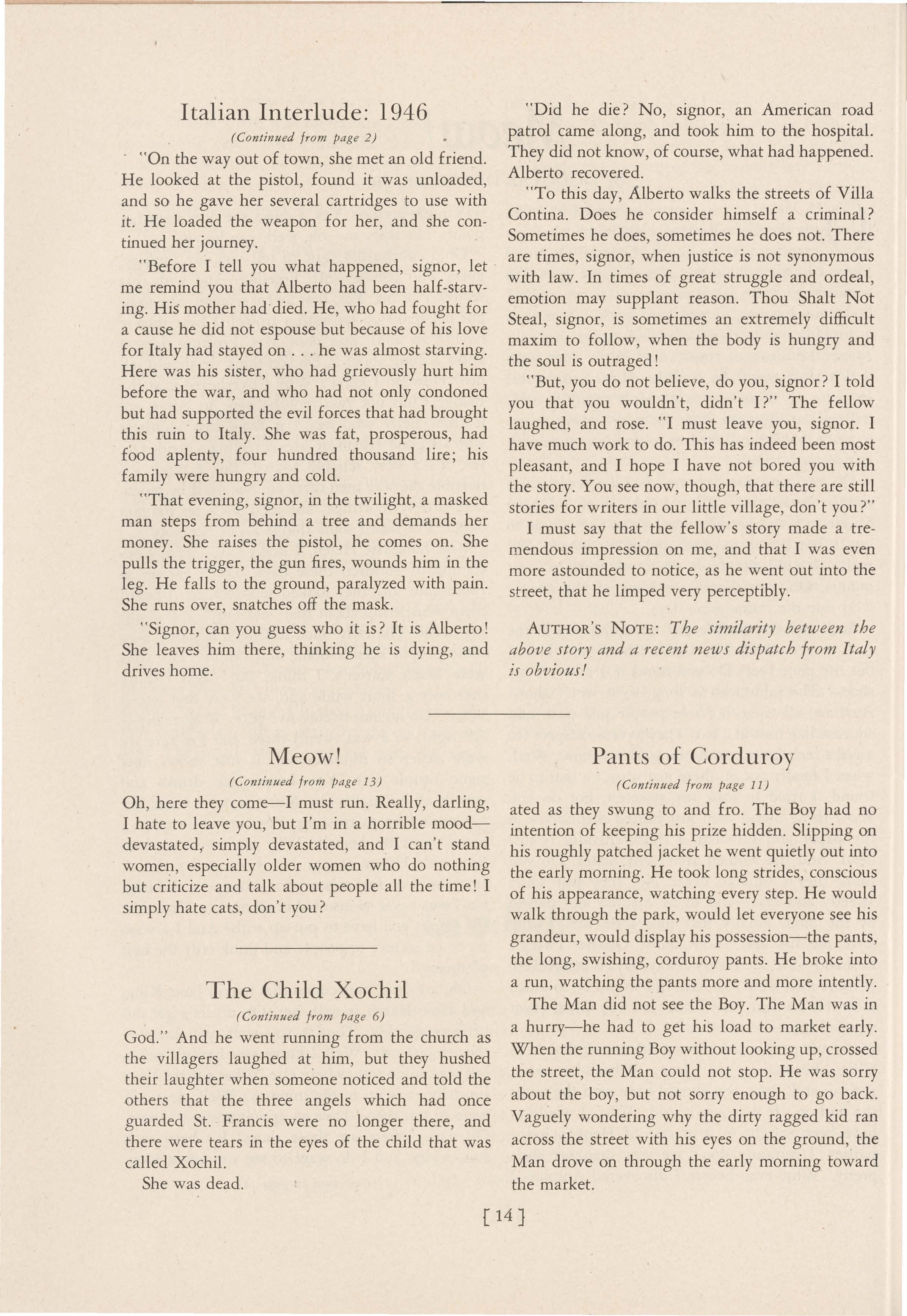
"Did he die? No, signor, an American road patrol came along, and took him to the hospital. They did not know, of course, what had happened. Alberto recovered. ·
"To this day, Alberto walks the streets of Villa Contina. Does he consider himself a criminal? Sometimes he does, sometimes he does not. There are times, signor, when justice is not synonymous with law. In times of great struggle and ordeal, emotion may supplant reason. Thou Shalt Not Steal, signor, is sometimes an extremely difficult maxim to follow, when the body is hungry and the soul is outraged!
"But, you do not believe, do you, signor? I told you that you wouldn't, didn't I?" The fellow laughed, and rose. "I must leave you, signor. I have much work to do. This has indeed been most pleasant, and I hope I have not bored you with the story. You see now, though, that there are still stories for writers in our little village, don't you?"
I must say that the fell ow' s story made a tremendous impression on me, and that I was even more astounded to notice, as he went out into the street, that he limped very perceptibly.
AUTHOR'S NoTE: The similarity between the above story and a recent news dispatch from Italy is obvious!
Pants of Corduroy
(Continued from page 11)
ated as they swung to and fro. The Boy had no i~tention of keeping his prize hidden. Slipping on his roughly patched jacket he went quietly out into the early morning. He took long strides, conscious of his appearance, watching every step. He would walk through the park, would let everyone see his grandeur, would display his possession-the pants, the long, swishing, corduroy pants. He broke into a run, watching the pants more and more intently.
The Man did not see the Boy. The Man was in a hurry-he had to get his load to market early. When the running Boy without looking up, crossed the street, the Man could not stop. He was sorry about the boy, but not sorry enough to go back. Vaguely wondering why the dirty ragged kid ran across the street with his eyes on the ground, the Man drove on through the early morning toV:,ard the market.
[ 14]
A FreudianFantasy or Ingrid,Ingrid,WhereforeArt Thou?
By JACK DAVID
KP ARENTL Y all is serene and calm. Only the eye of Dr. Quackpott, internationally famous psychiatrist, detects anything amiss. The audience is spellbound and hushed before the picture of the well-manicured ward boy (hero) hanging by his feet from a web-like Jacob's Ladder, smiling, and caressingly whetting a bloodstained and apparently well-used axe. The one large central eye of this pleasant person is lighted intermittently on one side by an intense mercury vapor light.
Beneath our hero is the lovely heroine, Barbara, whose coiffure is brought to a pin point about eighteen inches above her forehead. She is clutching a volume on mental disorders to her breast, which is barely concealed beneath the sheerest of nightgowns. She is repeating over and over, "I don't know why I'm here."
In a dimly lit corner squats the brilliant linotype operator, drinking bottle after bottle of Lydia Pinkham' s Compound. The empty bottles are being arranged upside down in the order of a linotype machine, and the sot is babbling happily that when he has finished the machine, he will use it to publish literature for the local chapter of the W. C. T. u.
Outside, the rain pours torrentially, and by the brilliant flashes of lightning the rest of the staff of " Ill Manors" can be seen disporting themselves under the trees around a picnic lunch of dehydrated eggs, potatoes, and carrots.
An ancient gramophone is blaring a lilting tune,
easily identified as "Hubba, Hubba," when an old crone, charwoman from the incinerator next door, enters. Behind her she drags a catapult, on whose side the legend "Built by J.Caesar" appears. She staggers, regains her balance, ahd screams, "St.op da music, stop da music." She reveals that she had written the song and it was stolen by the hero, who is still swinging and whetting. "But now it's my turn," screams she.
Casting aside her brilliant green cape, she loads the catapult with atomic bombs and demolishes the entire area.
The end of the scene shows an ectoplasmic vision of Dr. Quackpott, summarizing the cataclysmically eventful evening:
"It is all very simple. Heathcliff ( the hero) Singleye' s mother frightened him with the story of Cyclops. Given time I could have talked him into having two eyes.
"Barbara Sharpontop's mother was kicked by a unicorn, which she was milking as a dairymaid. A few years of modern therapeutic psychiatry would have made her a normal, happy unicorn.
"The linotype operator? The job of setting up Pimbleton' s Pink Pill advertisement had been given to a man with less seniority. To get even, he decided to become a walking ad for Lydia Pinkham.
"The charming lady with the catapult, as you all know by now, was Superwoman.
"Me? I'm Superman! Hee Hee Hee Hee!"
THE END
Parodyon HChiquitaBannana"
By BUD CALISCH and JACK DAVID
I'm Professor Babcock and I've com•e to say, Trigonometry should be taught in a certain way. When the figures are down, and two times one is two,
That's the way they will bring-the best results to you.
You can put them down on paper,
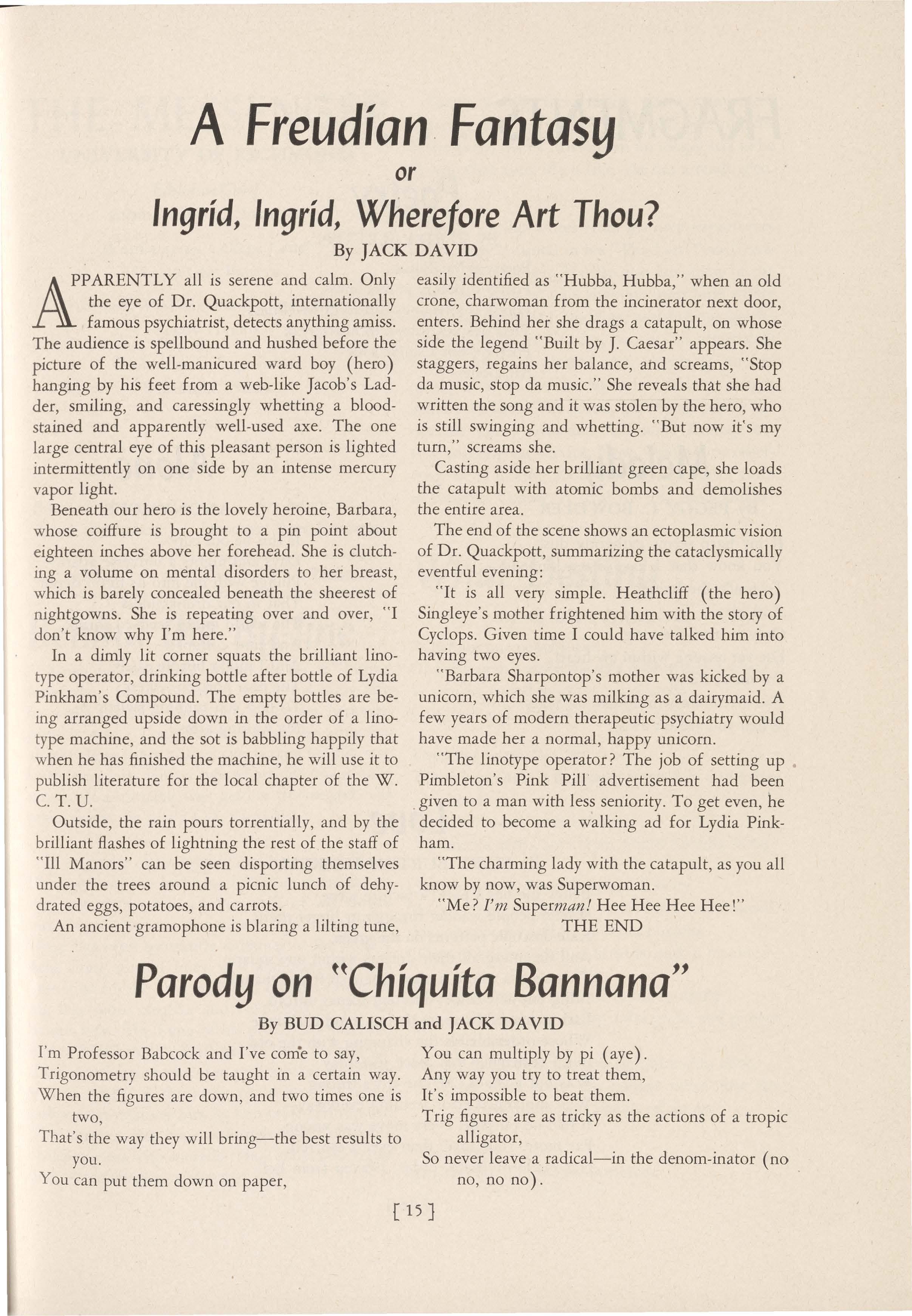
You can multiply by pi (aye). Any way you try to treat them, It's impossible to beat them.
Trig figures are as tricky as the actions of a tropic alligator,
So never leave a radical-in the denom-inator ( no no, no no).
[ 15}
FRAGMENTS • Poetry
By VERDA SLETTE~
Poetry is loneliness.
Poetry is beauty in loneliness.
Poetry is a tenuous thread of loveliness That ties heartbreak to heartbreak.
Poetry is but a single soul All alone.
Melody Alone
By PEGGY C. BOWDLER ANONYMOUS
If my harp seems gathering dust
You know that I have of ten longed
To touch the strings

If this be our cup-
Days and nights a universe apartPlunge with me into its bitter depth
That in our drunkenness And play
Only to have the song Die yet unsung within my heart. For music flows
The world might seem to shrink And time collapse, And I might hurdle easily
The near horizon-there Too often interwoven with my tears When you are far away.
To find you running swiftly to My ':"fiting arms.
Loue
By MARY BURTON HASKELL
Below me lies a park, a picture scene Where people wander through or linger there, Kaleidoscopic patterns on the green. And dreaming all their dreams within one square They seem a whole? ?-plan, where shift and change Bring but new color; different scenes unfold Each managed by son;ie tireless mind backstage Whose order blends the changing with the old. But I remember this place yesterday Was but a chaos. All the city's throng Was unplanned error seething everywayIt had no purpose, every move was wrong. Far more, your love, than ever I can tell, Has made of chaos, order; heaven from hell.
[ 16}
THE MESSENGER
UNIVERSITY OF RICHMOND
Editor-in-Chief
ANNE MARSHALL SKINNER
Westhampton College Editor
JACQUELINE BARNES
Assistant Westhampton College Editor
PEGGY HARRIS
Richmond College Editor
FLETCHER STIERS Staff
RoY WYATT
MARYLOU MASSIE THOMAS FLETCHER
Business Manager
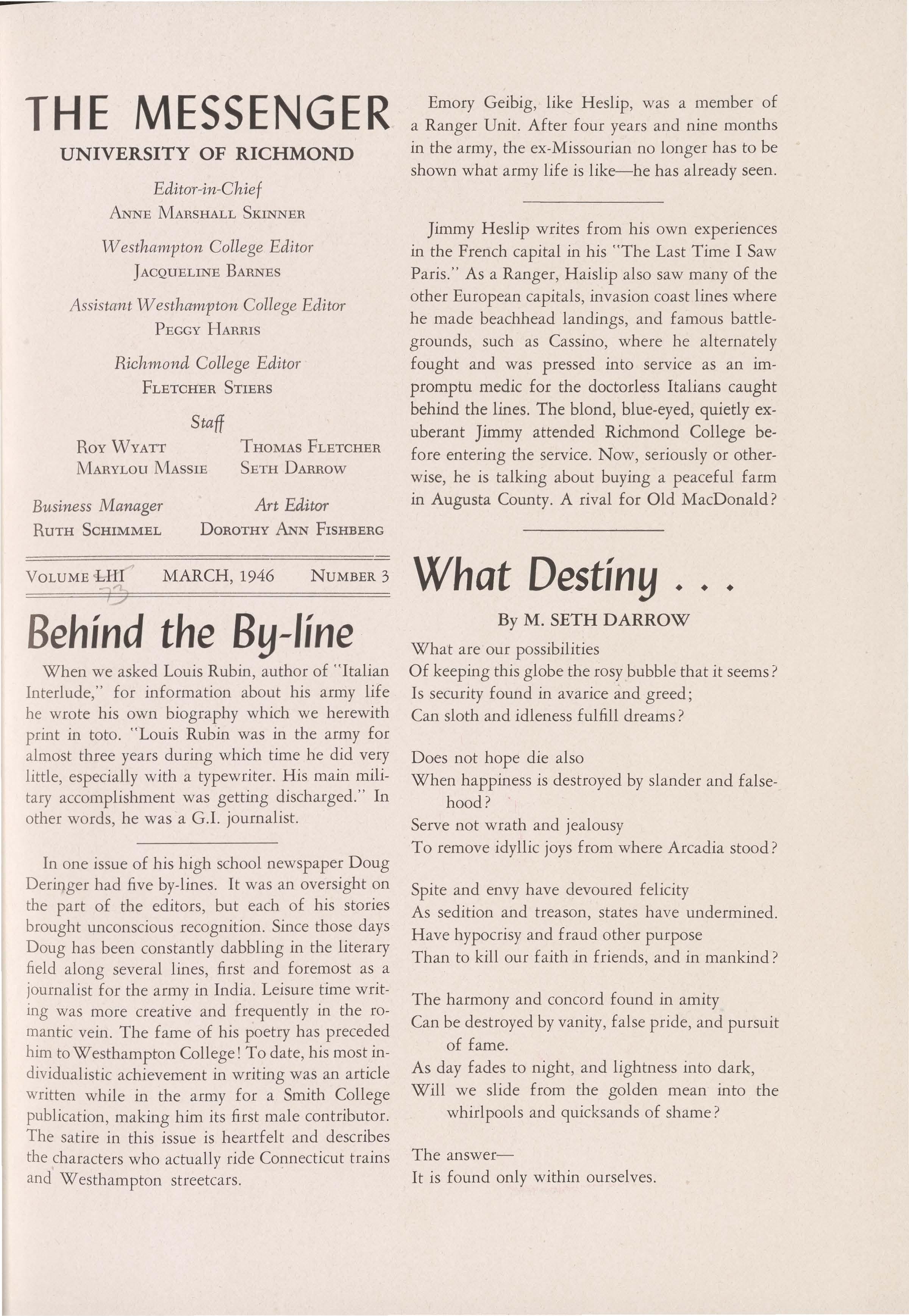
SETH DARROW
RuTH ScmMMEL Art Editor DOROTHY ANNFISHBERG
VOLU ME LIII
MARCH, 1946 NUMBER 3
Behindthe By-line
When we asked Louis Rubin, author of "Italian Interl ude ," for information about his army life he wrote his own biography which we herewith print in toto. "Louis Rubin was in the army for almos t three years during which time he did very little, especially with a typewriter. His main military accomplishment was getting discharged." In other words, he was a G.I. journalist.
In one issue of his high school newspaper Doug Deringer had five by-lines. It was an oversight on the part of the editors, but each of his stories broug ht unconscious recognition. Since those days Doug has been constantly dabbling in the literary field along several lines, first and foremost as a journa list for the army in India. Leisure time writing was more creative and frequently in the romantic vein. The fame of his poetry has preceded him to Westhampton College! To date, his most individualistic achievement in writing was an article writte n while in the army for a Smith College publication, making him its first male contributor. The satire in this issue is heart£ elt and describes the characters who actually ride Connecticut trains and Westhampton streetcars.
Emory Geibig, like Heslip, was a member of a Ranger Unit. After four years and nine months in the army, the ex-Missourian no longer has to be shown what army life is like-he has already seen.
Jimmy Heslip writes from his own experiences in the French capital in his "The Last Time I Saw Paris." As a Ranger, Haislip also saw many of the other European capitals, invasion coast lines where he made beachhead landings, and famous battlegrounds, such as Cassino, where he alternately fought and was pressed into service as an impromptu medic for the doctorless Italians caught behind the lines. The blond, blue-eyed, quietly exuberant Jimmy attended Richmond College before entering the service. Now, seriously or otherwise, he is talking about buying a peaceful farm in Augusta County. A rival for Old MacDonald?
What Destiny
.
By M. SETH DARROW
What are our possibilities
Of keeping this globe the rosy bubble that it seems? Is security found in avarice and greed; Can sloth and idleness fulfill dreams?
Does not hope die also When happiness is destroyed by slander and falsehood?
Serve not wrath and jealousy
To remove idyllic joys from where Arcadia stood?
Spite and envy have devoured felicity
As sedition and treason, states have undermined. Have hypocrisy and fraud other purpose Than to kill our faith in friends, and in mankind ?
The harmony and concord found in amity Can be destroyed by vanity, false pride, and pursuit of fame.
As day fades to night, and lightness into dark, Will we slide from the golden mean into the whirlpools and quicksands of shame?
The answerIt is found only within ourselves.
